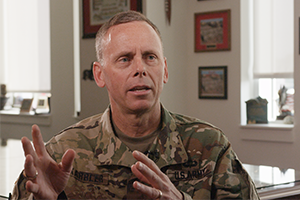Test, Fix, Test - Truth in Testing: A Talk With ATEC’s Commander
Maj. Gen. Daniel Karbler, Commanding General, U.S. Army Test and Evaluation Command (ATEC), was interviewed
by Christina McClung, ATC Point Position Staffer.

Major General Daniel Karbler
Soldiers load a military truck, head into the desert on night ops and take it for granted...the vehicle works. The brakes brake. The steering steers. Seat belts keep them from flying through the windshield. They just work... No...the vehicle works because somebody, somewhere, has tested every component. Their lives depend on it.
In combat, a Soldier relies on everything he or she touches, from boots, to tanks, to weapons...including the kitchen sink!
Testing to protect the men and women who defend our country is the sole mission of ATEC, overseeing eight subordinate organizations, employing 8,100 Army civilians, contractors and military personnel to test everything the Soldier wears, drives, eats and shoots…even the field kitchens.
ATC is one of those organizations, employing nearly 1,300.
“Testing is not just a check the box along the conveyor belt of the acquisition timeline,” explained Maj. Gen. Daniel Karbler, ATEC Commanding General, in an exclusive Point Position interview. Sometimes the process is “test…fix….test.” Often an item is submitted for testing with the assumption that “it’s just going to pass right away with flying colors right from the start,” Karbler said.
In testing an item, there is always the possibility that “it might fail, there might be a design problem, there might be a manufacturing problem. There just might be something wrong with whatever we’re testing…and back to the drawing board to fix that, so then we can retest it to make sure it will be ok to operate.”
Fiscal constraints have had a significant impact on testers, according to the West Point Graduate. “Nobody wants to fail and go back, because that’s going to be more time and more cost to the program. “What we try to do is stay flexible in our test and evaluation. We try to identify problems as early as possible up front, with the program managers.”
By anticipating testing issues, ATEC can help program managers to, as Karbler said, “make sure they account for the fact that their program might have to go back and redo some things. So build that into the schedule up front, so that they don’t hurt themselves trying to play catch-up at the end.”
An Air Missile Defense Officer, Maj. Gen. Karbler has served in Europe, Israel, Saudi Arabia, Qatar and at the Pentagon.
“My Patriot Battalion, and other Patriot Units I’ve been in, have undergone operational tests,” he said with a smile. “I joke that I’ve been a crash test dummy before, but I’ve never been the one applying the test and evaluation.
“At the end of the day, I can feel very confident that what the Soldier will get is going to work. But also, that what the American taxpayers are paying for is not going to be a waste of money.
“I want to tell all the ATC Teammates: Thanks very much for what you do every day to provide effective, suitable, survivable and safe equipment to our Soldiers.”
You are now leaving www.atc.army.mil and entering another site. You will automatically be forwarded to the target page within five seconds.
